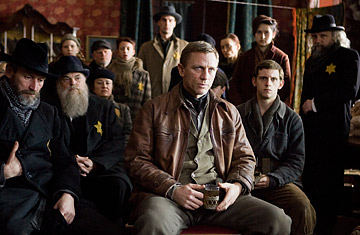
Daniel Craig as Tuvia Bielski in Defiance
(2 of 2)
Tough guys. The brothers may have been smugglers before the war. If they'd emigrated to urban America, they could have become enforcers for Arnold Rothstein or Legs Diamond. But in rural Eastern Europe, they use their chutzpah and woods-smarts to form a kind of kibbutz where they're the law. (You'll be reminded of two other recent movies about outdoor outlaws: The Assassination of Jesse James by the Coward Robert Ford and Che.) Torn from their farms and shops, they must steal food from the locals, some of whom turn the Jews in, some of whom risk their lives to protect them. The law of war is simple, harsh: German soldiers must die, as well as anyone in their company, including a woman they ambush on the road.
In this sylvan enclave, Tuvia Bielski (Daniel Craig), the eldest, is the de facto president, who insists that "We may be hunted like animals, but we will not become animals." His brother Zus (Liev Schreiber) is the impulsive general, whose motto is "Blood for blood." The two men war with each other almost as much as with the Nazis and Soviets who cross their path. The U.S. equivalent could be Harry Truman and Douglas MacArthur. In movie terms they're Michael and Sonny Corleone: one the brains, the other the ruthless muscle, of a family forged in violence. The third brother, Asael (Jamie Bell), is less the Fredo than the Connie. He doesn't enforce protection; he needs it.
This stalwartly, generically acted movie occasionally stumbles over its ambitions; it would have been shapelier as a Dirty Dozen celebration of rogue warriors, but it spends much of its time on the intricacies of running an underground community (the messy, wrenching political decisions), on infusing romance by finding "forest wives" for the brothers (including the very foxy Alexa Davalos) and on a running debate between two stock characters, the rabbi and the secular scholar. Zwick likes gray as much as black and white, though he's better at portraying the taut confrontations of the Bielski brigade and their pursuers. There are moments when Defiance plays as a traditionally satisfying action movie.
One critic was not satisfied by the attempt to wring larger inferences from the brothers' heroism. In the New York Times, A.O. Scott writes that making a story about the Bielskis "is a perfectly honorable intention, but the problem is that, in setting out to overturn historical stereotypes of Jewish passivity, Mr. Zwick (who co-wrote the screenplay with Clayton Frohman) ends up affirming them. His film furthermore implies that if only more of the Jews living in Nazi-occupied Europe had been as tough as the Bielskis, more would have survived. This may be true in a narrow sense, but it also has the effect of making the timidity of the Jews, rather than the barbarity of the Nazis and the vicious opportunism of their allies, a principal cause of the Shoah."
That's quite a stretch. Timidity in the face of overwhelming force is an issue relevant to any age, any people. The oppressed have always outnumbered the oppressors. So why, throughout history, did the victim majority not rise up and overthrow the ruling minority? Because the bad guys in power had the weapons and knew how to use them. Because the systems of social organization — the tribe, government, religion — taught that there was security in obeying the powerful and virtue in enduring pain in this life so as to be rewarded in the next. Because members of nearly every society, not just Germans under Hitler, or Jews in the camps, were trained to follow orders.
Defiance says it took grit, desperation and courage under fire to say, "Not this time," and fire back. Beyond that, it's a pretty good movie — a bold, uneasy mix of romance, political debate and vigorous action. Flawed as it is, the film mostly escapes the stigma of Holo-kitsch. In celebrating a people's will to live by any means necessary, Defiance too is worth celebrating. For now, you can postpone the moratorium.
